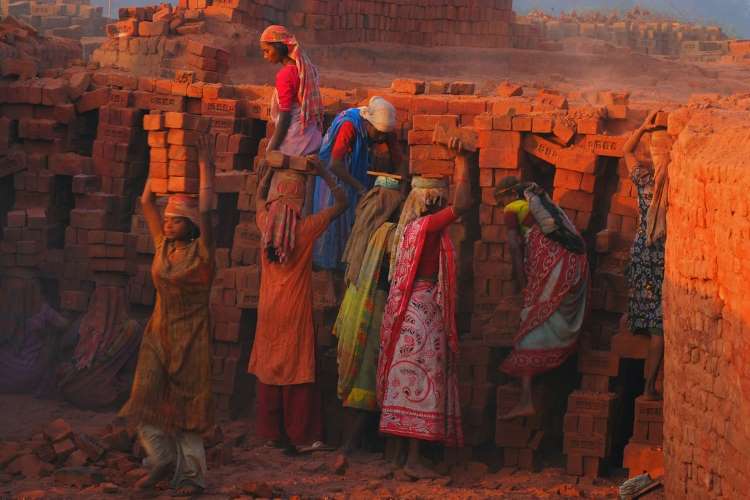
India has a trade union density of 12.8% which is distinctly low. The trade unions in India are experiencing a decline in membership in the last two decades. The world of work is changing fast and it is difficult to perceive how it will shape up in the future. In addition, the Covid-19 crisis has exposed and aggravated existing challenges. Globally, trade union membership has been declining over time. Also declining is their ability to organise workers, particularly in services sector and the informal sector. There is uncertainty looming over the future of trade unions.
Workers have relied on trade unions to enhance job and income security and access to social protection. The pandemic has laid bare the many dimensions of decent work deficits in the world of work from a global perspective. Despite all the restrictions during the pandemic, trade unions assisted workers and their families in different ways, ranging from legal advice, emergency funds, awareness-raising, modified training programmes and advocacy on recognition of Covid-19 as employment injury. Trade unions were also active in social media to reach out to working class as a whole and provided support activities during the pandemic.
READ I Out of coverage: Labour Codes must ensure basic rights to gig and platform workers
Social dialogue also played a very important role in this regard. Around 80% of countries used social dialogue as part of the response to the Covid-19 crisis. The most frequent topics of negotiation have been social protection and employment measures, industrial relations, occupational safety and health (OSH) and fiscal measures. Trade unions have found innovative ways to reach out to new members and contribute to crisis responses through social dialogue. Here are two examples.
Swedish trade unions mobilised new members in retail sectors following successful negotiation with employers to avoid lay-offs and protect workers’ wages during the pandemic induced lockdown and the aftermath. Trade unions used tele-communications and social media extensively to reach out to new members.
During the pandemic, the Georgian Trade Unions Confederation carried out awareness generation campaign among the informal workers about the stipulated eligibility criteria and help supplement the digital literacy they require to access governmental support package.
READ I Labour reforms: What do the four labour codes mean to businesses, workers
Where do trade unions stand now?
Trade union membership worldwide has been declining over time. There are exceptions in certain African or Latin American countries where membership increased. Various reasons that are attributed to such decline are as follows:
- Shift from manufacturing to service sector (identity of a worker is relatively fluid in service sector)
- Outsourcing of jobs (scattering of workplace and decentralisation of production)
- Informalization of the economy
- Changing employment relationship (proliferation of gig and platform economy) and automation.
The fact remains that trade union penetration is lower in non-standard or precarious employments such as temporary and own-account workers or workers in the informal and gig economy. Moreover, in recent times new legal restrictions have been imposed on trade union formation and trade union rights. Curbs have been introduced to restrict the scope for collective bargaining and social dialogue framework. Such legal impositions are set to adversely affect trade unions’ ability to organize, represent and safeguard the interest of workers.
In the newly enacted Industrial Relations Code 2020, restrictions have been imposed on conduct of strike and participation in the collective bargaining process. In the new scheme of things, it is not possible to strike work without giving prior notice. The way things have been conceptualised, it will be almost impossible to have a legally valid strike. If a trade union has a 51% or more membership, it becomes the sole negotiating union. Other existing trade unions cannot participate in collective bargaining process in such cases. This hinders growth of trade unions in the long run. Definition of strike has been broadened to include mass casual leave taken on a single day by 50% workers or more.
What the future holds for trade unions? There can be four possible scenarios for trade unions: marginalisation, dualisation, replacement and revitalisation.
Marginalisation: That trade unions continue to decline and get marginalized in the process.
Dualisation: In certain sectors like banking, insurance, formal manufacturing trade unions will maintain their hold and continue to exist. Trade unions will fail to mobilise workers in informal sector particularly in non-standard and precarious employment.
Replacement: Civil society organizations and non-governmental organisations may fill up the vacuum left behind by trade unions in certain areas and replace trade unions particularly in informal sector including the self-employed.
Revitalisation: Trade unions innovate and safeguard the interests of working class both in formal and informal sectors. Trade unions finds ways to remain relevant in the changing world of work.
There are areas where trade unions can grow in coming days and some of these involve:
- Organising workers in the informal or gig economy and workers and workers in underrepresented sectors.
- Ensuring sound internal governance through transparency, internal democracy and better management.
- Strengthening effective and inclusive social dialogue in a holistic manner.
READ I Labour reforms: How labour codes gave social dialogue, consultations a miss
Good practices involving trade union activities
There are success stories of trade unions mobilising workers in informal sector worldwide. The National Confederation of Workers of Senegal (CNTS) has created a national union for private security service workers and participated in collective bargaining to regularise workers in the informal economy, to provide access to medical insurance, to improve OSH, to ensure contribution to a pension and social security fund.
In Indonesia, motorcycle and taxi drivers and various trade unions established an Online Transportation Action Committee which is engaged in social dialogue with firms as well as with the ministries of transportation and manpower for better regulation of the sector.
The Vietnam General Confederation of Labour (VGCL) has focused on better internal governance. It evaluates the performance of individual unions and union leaders. It stresses on the renewal of the organisational structure and maintain effectiveness.
In Lithuania and Ukraine, unions are collaborating across borders through joint campaigning and a bilateral cooperation agreement to enhance recruitment and representation of Ukrainian truck drivers in unions in both countries.
In Zimbabwe, the Zimbabwe Congress of Trade Unions (ZCTU) had formulated the national development strategy and progress report on the Sustainable Development Goals. The union’s inputs underscored the role of decent work in developing a pro-poor and pro-worker Covid-19 recovery process and a sustainable development strategy.
READ I Electronics manufacturing: Some practical steps to make India a global hub
Organising informal workers
Organising informal workers provides opportunities for trade unions to expand membership and collective bargaining coverage to protect labour rights, strengthen workers’ collective voice, and influence social and economic policies. Unionisation among the informal sector workers is very low. Ambiguous employer-employee relation and scattered nature of production structure makes it difficult for mobilisation of workers. However, informal sector workers suffer from lack of basic labour rights. As individuals, they don’t have a voice and this is being exploited by the employers.
Skewed labour market in the form of huge excess supply of labour further aggravate the situation. Workers in informal sector subsist in a state of perennial job insecurity and low wages. Role of trade unions become very important here. There exists a huge vacuum here and trade unions need to act fast. In this regard, the ILO Recommendation No 204 is a unique instrument that provides guidance to a rights-based approach on the transition from the informal to the formal economy. This recommendation has universal relevance.
It acknowledges the broad diversity of situations of informality including specific national contexts and priorities for the transition to the formal economy and provides practical guidance to address these priorities. Such transition is not possible without trade unions. In India, around 93% workers are informal workers. But trade unions are mostly seen in formal sectors only. This implies that trade union presence is limited to small segment of the total workforce. In last three decades, trade union membership is declining in formal sector.
If trade unionism is to survive it has no option but to expand its base in informal sector as well as mobilising informal workers in formal sector. There are challenges in organisation of informal workers in the sense that informal sector is scattered across space and employer-employee relation is very sketchy. Identity of worker is very fluid and workers have little consciousness about belonging to the working class. That makes the work of trade unions further difficult.
Also, in the present context, a sizable volume of economic activities occurs at domestic spaces. Its again an unfamiliar terrain for the traditional union to mobilise workers. Traditional trade unions still aspire to mobilise workers in big factories and establishments. But number of big factories have declined over time since production structure is getting decentralised and employment relation has become increasingly informal. Insufficient unionisation of the informal sector has led to intervention by the civil society and non-governmental organisation.
There are huge decent work deficits and absence of labour rights in informal sector. This is no surprise that some organisation or the other would take up the cause of the workers in such situations. The usual trade union space is increasingly being filled up by civil society organisations. But such organisations have certain inherent limitations in dealing with issues pertaining to labour rights. Trade union is apposite to play this role. It is imperative that trade unions immediately focus on expanding their base in informal sector including the informal segment of the formal sector.
Dr Kingshuk Sarkar is an associate professor at the Goa Institute of Management. He has worked as a labour administrator with the government of West Bengal. He earlier served as a faculty member at VV Giri National Labour Institute, Noida and NIRD, Hyderabad. Views expressed are personal.

